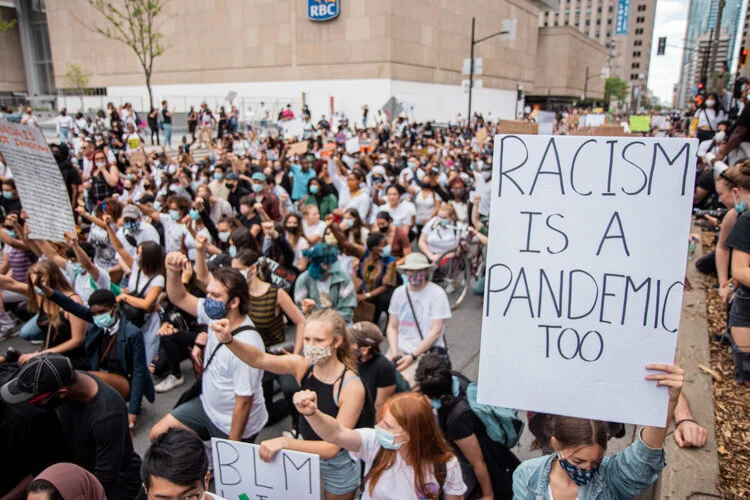Jeff Thompson, a disability employment specialist from a community organization in Canberra, reflects on the changing landscape of disability services, and wonders who the current policies are serving. Are faith-based and for-profit organizations able to deliver the ‘choice and control’ promised by the National Disability Insurance scheme (NDIS)?
Read MoreThere has been much talk of the ‘she-cession’ and whether the Federal government’s policy responses are adequate to respond to changes in employment. In today’s analysis, Leonora Risse (@Leonora_Risse) of RMIT (@RMIT) and the Women and Public Policy Program at Kennedy School (@wapppHKS) provides the data analysis to explain why women are being disproportionately impacted by the economic downturn and how the government could provide more targeted responses. You can also read Dr. Risse’s very popular analysis of the COVID-19 frontline workforce’s undervalued status as well as her thoughts on making the pandemic an opportunity to re-imagine a more just economy.
Read MoreJeremiah Brown (@jeremiahtbrown) is a social policy Research Fellow at the Centre for Social Impact. In today’s post he talks about using economic dignity as a guiding principle for the economy. This work was completed during his time as the inaugural Brotherhood of St Laurence ANZ Tony Nicholson Research Fellow. You can read a longer discussion paper about conceptualising economic dignity here, and see how it can be applied to develop a financial wellbeing framework here.
Read MoreThe Australian government has recently announced a $20 million injection of funds into mental health and suicide prevention research, acknowledging that disruptions to usual routines due to COVID-19 are increasing risk. However, it is notable that where mental health research is funded specific to one gender, it is most often designated for males. Today’s analysis explains why lopsided funding is misplaced; women experience worse overall mental health compared to men, and they are also disproportionately negatively impacted by COVID-19 and its policy responses. This analysis has been adapted from a policy brief compiled by Women’s Health Victoria (@WHVictoria) for the Women’s Mental Health Alliance. Graphs appear courtesy of Gender Equity Victoria (@genderequityvic); view their infographics here.
Read MoreAs unemployment soars, our social welfare systems have been given a much-needed overhaul, albeit these changes are thus far considered temporary. What has not yet been discussed in any meaningful way is how the government will support people back into work. In today’s piece, Simone Casey (@SimoneCasey) of Per Capita (@percCapita) provides an analysis of the Work for the Dole program, an “employment program” that has been highly problematic. This piece first ran in Croakey.
Read MoreWhile it was anticipated that lockdown measures in response to the COVID-19 pandemic would increase incidences of domestic and family violence, barriers to women accessing help made the full effects difficult to measure. In today’s analysis, Hayley Foster (@CEOWomensSafety) of Women’s Safety NSW (@WomensSafetyNSW) shares a summary of findings from a survey of practitioners which provide an emerging picture of what women’s experiences have been in lockdown and how the service system needs to be strengthened so that women have a realistic pathway to safety. Specific recommendations for keeping women safer provide a roadmap for immediate service and policy reform.
Read MoreMuch has been written about the gendered impacts of COVID-19, the attendant economic downturn and the government policy responses. In today’s analysis, Signe Ravn (@Ravn_Signe), Brendan Churchill (@BrenChurchill) and Leah Ruppanner (@Leahruppanner), all of University of Melbourne, explain why young women are facing particular employment challenges and how government policy responses are failing to account for their particular circumstances. Young women are at risk of falling through the policy cracks, with long-term negative outcomes for their economic security.
Read MoreIn today’s post, David Hildebrand from the Immigration Advice Service in the UK breaks down some of the reasons why people from BAME communities have been disproportionately impacted by COVID-19.
Read MoreThis post questions the Morrison Government's recent decision to extend the Cashless Debit Card trials until the end of 2020. Dr Shelley Bielefeld (Law Futures Centre, Griffith University), Susan Tilley (University of South Australia), Priya Kunjan (University of Melbourne) and Dr Elise Klein (Crawford School of Public Policy, Australian National University) argue that the decision is unjustified by research and evaluation, and will do more harm than good during the COVID-19 pandemic.
Read MoreAustralians with disability represent some of the most excluded of all Australians in relation to the impacts of coronavirus. At the same time, many people with disability are particularly at risk from COVID-19, because of barriers that exist to their inclusion, and their need for ongoing support. People with Disability Australia asked people with disability to tell them about their experiences over the last two months, and have released a report on those findings today.
Read MoreIn today’s post, Sue Olney (@olney_sue) examines developments in Australia’s welfare-to-work system and rhetoric during the COVID-19 pandemic. She argues that the premise on which the system is built – that unemployment is an individual problem and that anyone the government deems capable of working can find a job if they’re pushed hard enough – has to change.
Read MoreThere is increasing understanding that economic abuse coincides with other forms of family violence and abuse, as the perpetrator is driven to exert power and control. Despite this, its hidden nature and the various forms it takes means it is seldom addressed in system responses. In today’s post, Dr Madeleine Ulbrick (@MaddyUlbrick) of Good Shepherd Australia New Zealand (@GoodAdvocacy) shares insights from her recently completed PhD on economic abuse responses in Victoria. She argues that to effectively achieve women’s physical security, their material security must be prioritised.
Read MoreRecent research conducted by the University of Melbourne and LaTrobe University reports that women are experiencing higher levels of anxiety as a result of the coronavirus, and while the Federal Government has recently announced $20 million more in financial support for mental health responses, the funding priorities are out of step with emerging needs. In today’s analysis, Sarah Squire (@SquireSarah) of the Butterfly Foundation (@Bfoundation) explains how COVID-19 responses are exacerbating poor mental health for women and girls who are impacted by disordered eating.
Read MoreIn today’s post, Dr Ann Kayis-Kumar, Professor Fiona Martin, Dr Jack Noone and Professor Michael Walpole from the University of New South Wales explain that many sole traders in Australia are experiencing financial hardship in the current pandemic because they are behind on their tax paperwork. Those helped by the UNSW Tax Clinic who were behind on their quarterly Business Activity Statements were, on average, seven years behind. Their financial vulnerability has long-term and widespread implications. This article was originally published in The Conversation.
Read MoreIn this post, Dr Belinda Townsend from ANU (@BelTownsend) says Australia can play a greater role in supporting mechanisms for affordable access to new treatments and vaccines for COVID-19. This piece was originally published on the East Asia Forum as part of its special feature series on the novel coronavirus crisis and its impact, prior to the 73rd World Health Assembly.
Read MoreIn today’s post, Dr Andrew Joyce, Dr Perri Campbell, and Aurora Elmes from the Centre for Social Impact Swinburne argue that a social enterprise focused Job Guarantee could be an important part of a suite of policies to address imbalance in the labour market in the wake of COVID-19.
Read MoreMillions of Australians are currently dependent on some form of government welfare payment, and many are experiencing financial stress for the first time. As the consistently poorest household type in Australia, single mothers are disproportionately acquainted with the distress of trying to maintain a household on low welfare payments and precious employment. Unsurprisingly, new ABS data indicates that single mothers have had the worst employment outcomes during COVID-19. In today’s analysis, Margaret Ambrose of the Council for Single Mothers and their Children reports on the findings of a national survey of single mothers to uncover what their pain points are, and how these might be addressed to increase their financial security and place them and their children on a positive trajectory.
Read More




















